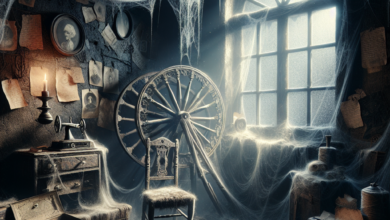Fragmented Reflections
The town of Luminas Heights was not just a place; it was a tapestry of stories, each thread more vibrant than the last. Nestled against a backdrop of jagged mountains, it bore witness to the passage of time in way that felt almost intimate. Its houses, adorned with splashes of paint peeling from age, held secrets under their roofs, while blooming gardens poked softly through audiences of white picket fences. Above all, Luminas Heights was governed by the rhythm of seasons, a gentle ebb and flow that residents took comfort in—the kaleidoscope of autumn leaves, the hush of winter’s snow, the riot of spring blossoms, and the sun-drenched days of summer.
Yet, buried beneath this tranquil facade lay a haunting reality; one which many in the town preferred to overlook. In the attic of an old, creaky house owned by Iris Falco, a woman in her early forties with unkempt hair and a collection of mismatched patterned sweaters, reflected the fragmented nature of memories that clung like dust to the rafters.
Iris had inherited the house from her grandmother—a woman of fierce independence whose stories were as colorful as the fabric she wove. It was said that Granny Falco had practiced a peculiar craft; she spun not just wool, but yarns of fate that seemed to hold pieces of truth within their tangled weaves. Iris herself, while creative in spirit, felt largely disconnected from the artistry of her lineage. She spent most of her days shuffling through work at the local diner, serving pancakes and coffee, while her nights were swallowed by boredom and the quiet echoes of an empty home.
One particularly drab morning, after a restless night filled with dreams of vibrant, swirling colors and haunting laughter, Iris decided to ascend to the attic. The sound of her footfalls echoed through the creaking wooden stairs as she climbed, and the air shifted in the small space where she stored her grandmother’s trinkets. Old frames covered in dust peeked out from under layers of blankets, and a peculiar warmth seemed to radiate from the assortment of forgotten items throughout the cramped quarters. Curiosity pulled her deeper into the dim light that filtered through a broken window.
Among the mounds of old fabric scraps and the wooden loom that had long since gone unused, something shiny caught her eye. An ornately framed mirror lay at the bottom of a box marked “Keep.” The frame was filigreed with delicate vines, the silver torch-burned to a burnished glow. An odd unexplainable energy rose within Iris as she lifted it from the box and brushed against its surface. Suddenly, a chill flickered along her spine.
As she gazed into the mirror, Iris felt as though she was peering not just into the glass but into her very soul. The reflection was oddly distorted, her features adjusting into intermittent images, fleeting moments from her past. One moment she saw herself as a spirited ten-year-old, dancing in her grandmother’s living room, while the next, she was a sullen teenager, nursing her first heartbreak under the rolling clouds of a summer storm.
This disturbance alarmed Iris and compelled her at the same time. The images continued to flicker—fragments of laughter, tears, and dreams that had been abandoned swam within the glass. Each flicker drew her toward a new tableau that resonated with hidden pain. Every moment she had neglected, every voice she had pushed aside echoed back to her, beckoning her deeper into the narrative of her life.
An unsettling realization emerged: the mirror was a vessel, a keeper of her fragmented memories, urging her to confront the truths she had long since buried. With each refraction, the scenes breathed life, demanding acknowledgment of the loss and identity that permeated her very essence.
Oddly enough, as the sun set and ushered in twilight, Iris felt her isolation deepen, yet the mirror provided a comforting reminder that it wasn’t merely her own solitude that shaped her world; it was also the arrival of stories that titled toward the sacred. She began to visit the attic nightly, bonding with the vivid recollections the mirror whispered back to her.
Yet, Luminas Heights was notorious for keeping its own tales vault-like, hiding them beneath leaves and shadows. Each morning after her evening rituals, Iris noticed changes unfolding within her waking life—the diner filled with more patrons, conversations spun with warmth, and laughter surrounded her where silence once thrived. The townsfolk who had once draped themselves in the garments of habit became threaded into her stories as their paths intertwined with her own.
There was Leo, the poet whose verses caressed the winds and swept through the streets like autumn leaves. He was often seen pacing under the bewitching wisteria tree that framed the town square, capturing every fleeting thought in his tattered notebook. Incorporating snippets of her own reflections into her conversations with him, Iris found the beauty in creating rather than existing.
Then there was Reva, the aging craftsman who made wooden sculptures that mirrored fragility and strength. She spent hours watching him shape his art in his workshop, letting the (once) murky corners of their exchange cultivate new blooms of friendship. Each meeting was a tender reflection of her own aspirations being crafted in the hands of another—intensifying the courage she had long abandoned.
One rainy evening, as Iris stood in the diner, pouring decaf for weary souls, she felt an unexpected urge to shield those around her from the suffocating darkness she had tasted herself. Drawn by a force she couldn’t explain, she decided to host an art night—a space where the threads of their lives could intertwine and become something more than mere fragments. As the sun dipped low on that fateful Friday, she hung inviting banners along the diner’s walls, scattering art supplies she had collected in the days leading up to the event.
Under the glow of string lights that illuminated the diner’s corners, a spectrum of talent laid bare—strangers mingled effortlessly, sharing secrets and crafting tiny canvases of solace. Laughter echoed, breaking the shadows that had long overshadowed Luminas Heights. It seemed the whole town came alive in those moments, harmonious in a way Iris had never felt before.
As the evening progressed, Iris found herself magnetically drawn to the mirror resting atop a makeshift pedestal in the corner of the diner. Its aura glimmered enticingly, spirited whispers escaping in gentle breezes. She stepped closer, her fingers trembling against its cool surface, an invitation beckoning her to explore.
In that moment, Iris knew she needed to share the mirror’s magic with her friends—the beauty of their intertwined stories woven like a tapestry through the ages. “I have something to show you,” she called to the group.
As they gathered around, curiosity shimmered in their eyes. Vashti, a spirited painter, reached out first. The moment her fingers brushed the surface, she gasped, leaning closer. Images cascaded like a stream, showering them with colorful hues of memory. There were moments of disappointment, love, joy—and a sense of belonging that knotted them together amidst the external chaos.
Iris felt a rush of exhilaration as each person discovered their woven narratives. Emotions swelled, laughter rolled like thunder, and tears flowed freely. They shared their joys, regrets, pasts, and dreams—a living embodiment of love forged from the remnants of solitude.
As the night deepened, they spoke of their fragmented experiences that had, until that moment, felt isolating and insurmountable. Bonds strung tighter and stronger, a tapestry evolving within the reflections now revealed in vivid clarity around them.
It was then that Iris understood. The mirror was not merely a reflection but a vessel for healing. Not just for her but for everyone who dared to look within. She saw her grandmother’s spirit alive within them all: weaving threads of connection, understanding, and love where before there had been only silence and shadows.
What began as a humble mirror became the heart of Luminas Heights—allowing amends to be made, shadows to slip away, and shattered pieces to willfully mend as they formed a new picture together. They became not just a town, but a community—deeply intertwined in both joy and pain, nurturing one another like the blossoms that continued to thrive within the gardens they tended.
Iris regarded her companions amidst the warmth of shared vulnerability. Their stories became threads in her tapestry, whispers of the past fueling the creation of their new reality. No longer was she merely a diner waitress or a solitary woman haunted by remnants of her own fears—she was a creator, an architect of connections shaped through their collective reflections.
In moments of solitude, she would still wander to the attic, but no longer to seek solace alone. She returned to the mirror, each time enchanted by the continued dance of memories it held. Rather than lose herself within the fragmented glimpses of who she had been, Iris embraced each moment with fierce gratitude.
The mirror became a legacy—a sacred portal through which they shared revelations, transformed anguish into art, and celebrated their intertwined paths. The tapestry spun from those reflections remained forever vibrant in Luminas Heights, weaving an eternal cycle of wholeness even as time continued its relentless march forward.
As seasons changed and the years slipped through their fingers, Luminas Heights flourished. Community art nights became a cherished tradition, and in one dazzling corner of the diner stood the old mirrored frame, a beacon of hope and unity—a reminder that the most beautiful of lives are often composed of fragmented reflections seen through shared stories and courage. Together, they became light—radiant, purposeful, and beautifully whole.





